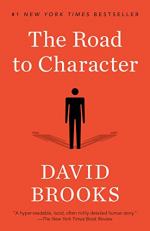|
This section contains 740 words (approx. 2 pages at 400 words per page) |

|
The Road to Character Summary & Study Guide Description
The Road to Character Summary & Study Guide includes comprehensive information and analysis to help you understand the book. This study guide contains the following sections:
This detailed literature summary also contains Topics for Discussion on The Road to Character by David Brooks.
The following version of this book was used to create the guide: Brooks, David. The Road to Character. Penguin Random House LLC, 2015.
David Brooks noticed a shift in American culture between the earlier and later halves of the 20th century. The older culture is based on a moral culture of realism, while the newer culture is based on a moral culture of romanticism and idealism. In the 21st century, the culture is shifting even more to self-celebration. What we now need is to return to the realism of the past.
In order to cultivate character, we have to cultivate our own strengths without ignoring our weaknesses. There has to be an internal struggle between the various parts of the self, in order to achieve a satisfactory inner world. Every individual with character has a U-shaped journey — they all go down before they go up. When an individual is in a bad place, the concept of the self is destroyed but then rebuilt with strength and self-respect. Without this journey, one cannot experience fulfilling joy.
Frances Perkins lived in New York City when she witnessed the Triangle Shirtwaist Factory Fire of 1911. That day, many girls died jumping out of high floors of a factory due to unsafe working conditions. She did not let this tragedy make her complacent, but rather she let it ignite her passion for labor reform. She worked for the interests of the working class for the rest of her life, even becoming the Industrial Commissioner of the United States.
Ida Eisenhower had emotional strength and self-discipline. She raised Dwight Eisenhower carefully and with love, teaching him to control his emotions until the time was right. He worked under superior officers in the army for quite some time, and outright despised a direct superior — General Douglas MacArthur. However, he learned to hide this hatred and was eventually promoted. He went on to become the President of the United States.
Dorothy Day was always religious, but did not have a healthy structure to her beliefs until she discovered the Catholic church. She established a newspaper, a soup kitchen, and hospitality houses for the homeless and the poor. She lived there with them in solidarity, while also writing and working. Her memoir, the Long Loneliness, made sure that her name would be passed down through history.
George Marshall overcame bullying at the Virginia Military Institute before graduating as the leader of his class. He then joined the army and was known as the Wizard for his skills in organization. His reputation with the public and with the White House as a man with integrity only grew as they learned more about him. He was always led by his sense of obligation, and never turned down an important job.
A. Phillip Randolph was a successful labor union organizer who helped a large number of workers at various companies in New York. He formed a March on Washington for racial equality, and only canceled it when the president signed legislation banning racial discrimination in national defense.
Mary Anne Evans, who wrote under the name George Eliot, grew to be intellectually mature early. She was intelligent and explored big ideas. However, she was still emotionally stunted due to her lack of a relationship with her mother and spent much of her time chasing after unavailable men. However, eventually she was able to find true love. At that point, she was willing to defy her family and leave her entire society behind in order to pursue true love and her literary dreams.
Augustine grew up as a golden boy in the Roman Empire. He was well-educated, and decided to join the Manichaean school of philosophy before realizing it did not bring him spiritual satisfaction. He created Augustinian Christianity when he realized that what he had to do was surrender himself to God’s love.
Samuel Johnson grew up with a multitude of medical afflictions in a penurious family. However, he was intelligent, ambitious, and hardworking. After a long period of depression in his early adulthood, he spent his days writing and socializing. He was a prolific and talented writer, incomparable in his time. The dictionary that he compiled brought him the most fame.
Ultimately, the culture must return from romanticism to realism. The focus needs to shift back toward the community rather than the individual. Pain, struggle, and honesty are necessary for the development of character, which is necessary to find joy.
Read more from the Study Guide
|
This section contains 740 words (approx. 2 pages at 400 words per page) |

|



